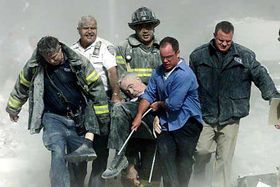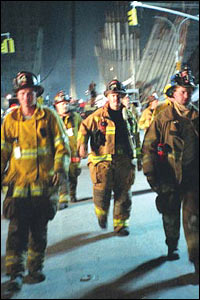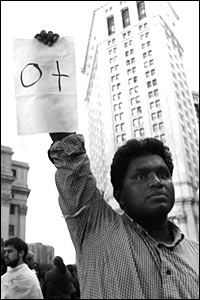
I remember that day.
It began just like any other day.
The sky was blue – perfectly clear,
And if I had been watching,
I could have seen the plane change direction.
U-shaped contrails.
At first, no one understood
The hatred that had struck.
And then, as a second jet collided,
A building melted,
Our hearts, our peace, and our security were demolished.
Lord; take me where you want me to go;
Let me meet who You want me to meet;
Tell me what You want me to say,
and keep me out of your way. AmenI remember the disbelief,
As estimates of the dead climbed.
Horrible possibilities, horrible numbers were broadcast.
Buildings collapsed as we watched.
We knew they hadn’t been empty
And that the stench of death crept
Along with the dust and dirt.
The Pentagon burned.
Air traffic was grounded,

Except for the one plane that
Crashed into the ground.
Lord; take me where you want me to go;
Let me meet who You want me to meet;
Tell me what You want me to say,
and keep me out of your way. AmenI remember the heroes.
The fireman, who turned to go back in,
Saying, “It’s what I do.”
The passenger, knowing death was coming,
Who said, “Let’s roll.”
The cell phone calls to family,
Love, the first and last thing on their minds.
The photos – Have you seen my wife?
The doctors, nurses, hospitals,
Standing ready for the injured who would never arrive.
Long lines to give blood.
The prayers, the unity, the tears.
We were in it together.
St. Paul's chapel, near Ground Zero,
Open to nurture anyone who needed it.
Lord; take me where you want me to go;
Let me meet who You want me to meet;
Tell me what You want me to say, 
and keep me out of your way. AmenI remember the worry,
When reality finally set in.
What would we become?
Would fear win,
And would we reflect back hatred?
I remember the high school student
Who was slammed against his locker
For looking Muslim.
But I remember the memorial service in New York
Christians, Jews and Muslims,
All praying together,
People, feeling the hatred,
And returning something better.
What would we become?
Lord; take me where you want me to go;
Let me meet who You want me to meet;
Tell me what You want me to say,
and keep me out of your way. AmenI can never forget the change,
Even now, even today.
We live in a world that is post-9/11.
Our 9/10 attitudes are gone.
Long airport security lines,
And we’re glad.
Anything to feel a little bit safer.

Our first question now, when tragedy strikes,
Isn’t “What went wrong?”
It’s “Who did it?”
Even now, on a clear day,
I look at the blue sky,
See a U-shaped contrail,
And wonder.
Prayer between stanzas is the prayer carried by Father Mychal F. Judge, Chaplain, New York Fire Department, who was killed on 9/11 at the World Trade Center.Images: - Image of Father Mychal Judge's body being carried out of the World Trade Center by a police officer, two firefights and an OEM responder. He was the first recognized victim of the attack.
- Firefighters on their way to the scene.
- Man holding up his blood type as he stands in line to donate.
- Wall of posters as people try to find their loved ones.

























